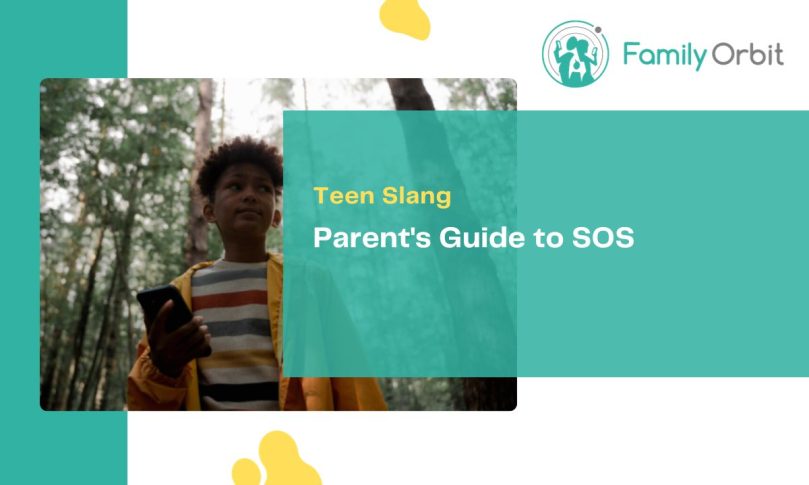“SOS” is a popular slang that you often see in your kids’ chats. At first glance, you might think it is a cry for help. But do not worry, “SOS” in chats and online conversations usually has no connection to any emergency situation.
In the online realm, SOS is commonly used to express annoyance or frustration about a specific situation. So, when you spot this acronym in your child’s chats, it does not mean they need help of any sort. Here we will help you explore the different meanings and contexts of SOS, so let’s get started!
Breaking the Silence: SOS Slang Emerges in Teen Vernacular
Originally, SOS was a distress signal sent over Morse code. Interestingly. The original term SOS doesn’t stand for anything as it was just a simple way to send a signal, which was three dots, three dashes, and three dots. It was only later that it became associated with phrases such as “save our soul” or “save our ship”.
However, in chat slang, SOS is usually not a signal of physical distress. For instance, SOS may stand for “someone over shoulder.” It is also short for “same old stuff”, but the “stuff” may also be a curse word that rhymes with “hit”!
There are other meanings too, which can make it confusing. Some may use it as “someone special” but it can also mean “shoot on site”. The last meaning was made popular by rap artists Streetlife in their song “Shoot on Sight (S.O.S.)”.
SOS Unveiled: Deciphering the True Significance
The true significance of the “SOS” chat acronym is associated with the context. Several decades ago, SOS was a coded cry for help among ship captains. In the mid-1970s, the hit pop band ABBA featured it in one of their hit songs called “SOS”.
However, in modern slang, it stands for different meanings, usually “someone over shoulder” or “same old stuff.” The former means that the sender can’t talk freely, as someone, mostly a parent or an older sibling, is watching their messages.
The latter indicates that the sender has nothing new going on, and it’s an indication of boredom or routine.
When Teens Call for Help: Typical SOS Usage Scenarios

Teens often use the acronym “SOS” in multiple ways. Depending on the tone and the context of the conversation, you can identify the actual meaning.
Generally, a serious tone means that they need help to get out of a specific situation. Conversely, in a more trivial context, “SOS” expresses frustration about some inconvenience. Here are a few examples of the common uses of SOS.
1. “Mom, SOS, I wanna out of my aunt’s house; the twins are so noisy and messy”.
2. “Mady, I’ll text in a sec, SOS”. In this text, the sender promises to talk in detail later, as a parent is monitoring their chat.
3. “Schoolwork is getting more difficult and overwhelming, and I have exams in a couple of days. SOS, can I talk to you now?” In this text, the sender is looking for emotional support and wants to express frustration to a person who would listen.
4. “SOS, I keep getting hate and body shaming messages. Please, help block these guys.” In this example, a teen is exposed to cyberbullying and seeks help from online friends to stop it.
5. “SOS, I need to leave the party now. Things are getting very weird.” In this example, a teen feels uncomfortable and there might be a chance for real physical distress. So, they are asking for help.
The tricky part is that if used for “standing over shoulder” there may be no context at all. They may use it when they are having a regular conversation but feel they are being watched. For example:
Person 1: “I need to talk to you about me and James”
Person 2: “SOS”
Person 1: “Chat later”
Here the first person wanted to share some personal information but was warned by person two that someone else was reading their chat. Person 2 understood the message so didn’t carry on the conversation.
SOS in Real-life Situations: Understanding Its Contextual Range

As with most slang, context is what gives meaning to the acronym. Thus, “SOS” does not always indicate a plea for assistance in emergencies. In fact, teens are often using this acronym in their digital communications to complain about something or to show their annoyance.
However, there are instances when SOS is employed as a signal for distress, whether it be emotional or physical. Therefore, it is important to check the context, location, and even the purpose of communication of texts sent by your kids before rushing to aid them.
The Cry for Clarity: Why ‘SOS’ Is a Vital Term for Teens
SOS is an important chat acronym for teens, as it is expressive, versatile, and can be used in different contexts. Depending on the situation, SOS can convey a teen’s need for support or actual help.
However, the reality is that it’s mostly used to keep something secret. This could be cause for concern if they are trying to keep something important from you, but it’s more likely to be some harmless teen gossip they want to keep between them and their friend.
Parental Awareness: Grasping the Meaning and Importance of ‘SOS’ Slang
Given that SOS can have both funny and serious connotations, it is essential to understand which aspect your kids are expressing in their conversations.
Having this knowledge will give peace of mind and comfort. A good starting point is to educate yourself about the multiple meanings and uses of SOS. By doing so, you can actively engage with your teens and better understand them.
Connecting with Your Teen: Nurturing Open Dialogue About Slang
Embracing and accepting your teen’s use of chat slang is a cornerstone in nurturing an open dialogue. You can initiate such open conversations by showing interest in slang meanings and proper usage.
This approach is way more effective than rough confrontations about why they are using slang and their intentions. Instead, you can start a conversation about its multiple meanings and online safety precautions. By doing so, your kids may be encouraged to open deeper and more important conversations.
As a parent, it is natural to worry about your child’s online safety. While SOS is not usually something to worry about, it can be cause for concern if it’s a cry for help or you think your child is keeping something important from you.
A great parent control app will give access to your kids’ texts and online chats. Furthermore, you can have some extra peace of mind as these apps also allow you to track their location.
However, it’s best to use a parent control app alongside having ongoing open conversations with your teens. This is the best way to keep them safe while also ensuring they feel comfortable talking to you about any problems they may have.
- Monitor Calls & Text Messages
- View Photos and Videos
- Location Tracking & Geofence
- Monitor WhatsApp & Kik
- Detect & Alert for Inappropriate Activities
- Monitor Websites Visited
- Compatible with Android and iOS
- FWB Meaning: Shocking Insights Parents Must Know About Their Teens’ Online Lingo!
- YW Meaning: Decoding the Significance of ‘YW’ in Teen Slang
- What Makes an Emo Kid: Understanding the Emo Culture Among Teens
- Tool Slang: What You Need to Know
- FML Meaning: The Dark Humor of Teen Slang
- ANIME Unveiled: Delving into the World of Japanese Animation
- What Does TBH Mean: Decoding Teen Communication

